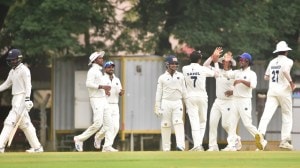We need warm food, doctors, writes a young officer to mom
AHMEDABAD, JULY 3: It's a simple, heartfelt letter written by a young soldier fighting in the icy peaks of Kargil to his mother. But some...

AHMEDABAD, JULY 3: It’s a simple, heartfelt letter written by a young soldier fighting in the icy peaks of Kargil to his mother. But somewhere in the multitude of emotions is a challenge: A challenge to fellow countrymen to do their bit for the troops on the frontline. There is no bitterness, just a feeling that more people read: NGOs and doctors could help those laying down their lives for the country.
“The Army has been firefighting for the country all this while. Now there is a fire in Kargil. And the Army needs help. Let me see how many people come forward,” says the officer, barely out of his teens. “The need is for warm food and medical help. Nothing big. We are not asking them to face the bullets and the bombs. Just let the country show us that they are with us in these trying times, and see the josh of these brave men”.
Without any trace of self-pity he writes, matter-of-fact, about being away from civilisation for weeks on end, surviving each day on five ice-cold `puris’ dipped intea…and, worst of all, not knowing how the people back home the people they are fighting for view the conflict. “It is amazing that 90 crore Indians are watching this like a cricket match between India and Pakistan. The Press is just writing about what a great job the Army is doing. Why don’t they write that we need doctors to attend to men who have been shot? That we need someone who can organise hot food?”
“Doctors have to come forward”, agrees Col RG Thomas (retd), a war casualty of 1971. “This is not the first time they will be volunteering and helping Army hospitals in such critical times. In the Bangladesh operation, civilian doctors flew in at their expense and operated in mobile field hospitals on the battlefield. I had splinters in the chest and was operated upon by a Bangladeshi neurosurgeon”. Help can also be offered in hospitals where battle casualties are shifted, he adds. The Army shifts injured soldiers from the front to field hospitals, base hospitals and then larger hospitals likeMH Delhi, Chandigarh and Srinagar. “Doctors can volunteer in these places, so can other organisations. Men come in with amputated legs, arms missing. Volunteers can write letters for them, read to them, keep them company and give moral support,” explains Col Thomas. “Volunteers are always welcome,” says Lt Col VK Arora, a retired Army aviation officer. “If civilian doctors with specialised expertise work in Army hospitals, it would leave the Army doctors free to travel with the men on dangerous missions in the heights where the action is taking place,” he says. The other need that officers are emphasising on is of hot nutritious food. “Going to the Army base is dangerous. They are within the reach of the enemy bullets. But if Kapil Dev and Ajay Jadeja can go there so can the others. NGOs can volunteer to cook for the men at their own risk”, says Lt Col Arora.



- 01
- 02
- 03
- 04
- 05




























